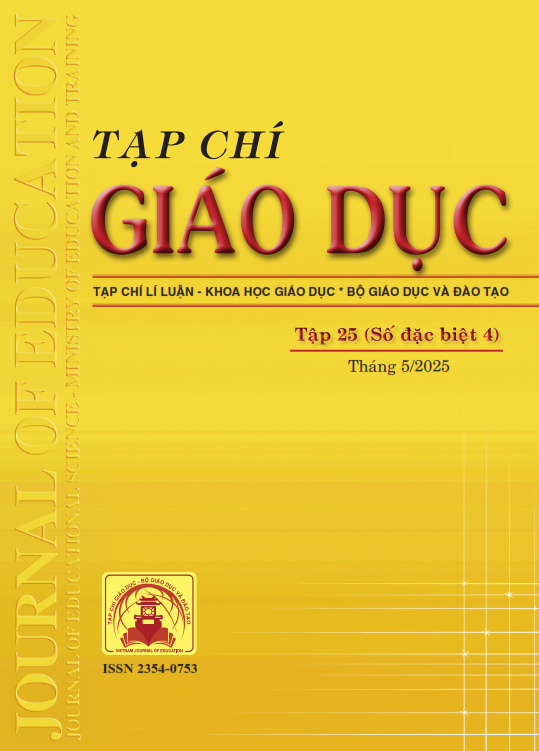Xây dựng thang đo đánh giá năng lực phát triển bền vững dành cho trẻ từ 5-6 tuổi tại Việt Nam
Tóm tắt
Sustainable development education is now integrated into the preschool curriculum in Vietnam and is showing significant potential for development. However, there is still a lack of appropriate assessment tools. This study develops and tests a scale to measure sustainable development competences in 5-6-year-old children in Vietnam, aiming to assess their awareness, attitudes, and sustainable behaviors in early childhood education. The scale, encompassing four domains Cognitive Development, Socioemotional Skills, Behavioral Practices, and Critical Thinking - was developed through expert consultation, pilot testing, and practical refinement. The results identified three main components: Individual and Spiritual Competence, Action and Collaboration Competence, and Systems Thinking Competence. The scale demonstrated high reliability and validity, providing a scientific tool for educators. It contributes to the implementation of Sustainable Development Goals in Vietnam, promoting early education on sustainability. Recommendations include large-scale testing, teacher training, and the application of technology to enhance effectiveness.
Tài liệu tham khảo
Davis, J. (2008). What might education for sustainability look like in early childhood? A case for participatory, whole-setting approaches. In Kaga, Yoshie & Samuelsson, Ingrid Pramling (Eds.) The Role of Early Childhood Education for a Sustainable Society. UNESCO, 18-24.
Elliott, S. N., & Gresham, F. M. (2013). Social Skills Improvement System. In F. R. Volkmar (Ed.), Encyclopedia of Autism Spectrum Disorders (pp. 2933-2935). Springer New York. https://doi.org/10.1007/978-1-4419-1698-3_509
McAfee, O. (2016). Assessing and guiding young children’s development and learning (Sixth edition). Pearson Education.
OMEP (2019). The OMEP ESD rating scale and toolkit. Early Childhood Education for Sustainability and Global Citizen Education. https://omepworld.org/wp-content/uploads/2021/02/2019-Introduction-to-the-OMEP-ESD-rating-scaleENG.pdf
Özkan, B., Tuğluk, M. N., & Yiğitalp, N. (2019). Environmental Sustainability Scale for Children 60-72 Months Old: A Validity and Reliability Study. Journal of Education and Training Studies, 8(1), 32-41. https://doi.org/ 10.11114/jets.v8i1.4485
Panter, J. E. (2000). Validity of the Bracken Basic Concept Scale-Revised for Predicting Performance on the Metropolitan Readiness Test-Sixth Edition. Journal of Psychoeducational Assessment, 18(2), 104-110. https://doi.org/10.1177/073428290001800201
Pearson, E., & Degotardi, S. (2009). Education for sustainable development in early childhood education: A global solution to local concerns?. International Journal of Early Childhood, 41(2), 97-111. https://doi.org/10.1007/ BF03168881
Redman, A., Wiek, A., & Barth, M. (2021). Current practice of assessing students’ sustainability competencies: A review of tools. Sustainability Science, 16, 117-135.
Soydan, S. B., & Samur, A. Ö. (2017). Validity and reliability study of environmental awareness and attitude scale for preschool children. International Electronic Journal of Environmental Education, 7(1), 78-97.
Ulrich, D. A. (2023). Test of Gross Motor Development - Third Edition. APA PsycTests. https://doi.org/ 10.1037/t87935-000
UNESCO (2017). Education for Sustainable Development Goals: Learning objectives. https://www.unesco.org/ en/articles/education-sustainable-development-goals-learning-objectives
Vesterinen, M., & Ratinen, I. (2024). Sustainability competences in primary school education–a systematic literature review. Environmental Education Research, 30(1), 56-67.
Wiek, A., Withycombe, L., & Redman, C. L. (2011). Key competencies in sustainability: a reference framework for academic program development. Sustainability Science, 6, 203-218.
Đã Xuất bản
Cách trích dẫn
Số
Chuyên mục
Giấy phép

Tác phẩm này được cấp phép theo Ghi nhận tác giả của Creative Commons Giấy phép quốc tế 4.0 .












